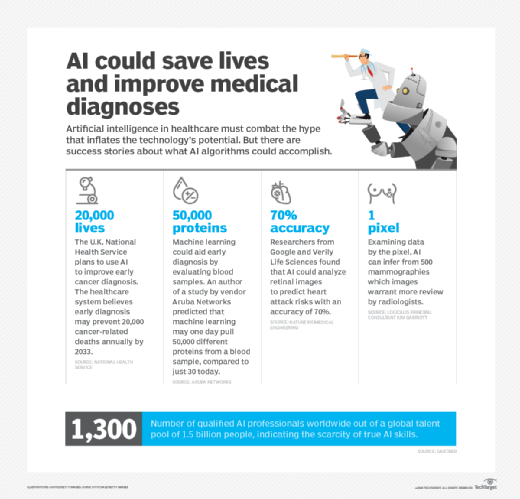
everythingpossible - Fotolia
Use of AI in pharma grows as drug-makers see big benefits
The use of AI in clinical trials, drug discovery and manufacturing is growing and, despite a few barriers, drug companies are expected to continue rolling out the technology.
Drug discovery, drug manufacturing, targeted clinical trials and personalized healthcare -- these are just some of the areas in which the pharmaceutical industry has implemented AI. AI enables a future in which we have more targeted, more personalized, faster and better overall healthcare.
Because the pharmaceutical industry has so much access to data, there are many potential applications for machine learning and AI.
AI helps with disease identification and drug discovery
Companies are using AI in pharma to research and develop diagnostics and therapeutic treatments. AI combined with big data and analytics is helping to detect and prevent illness before it happens. AI tools can also mine patient data and combine that with machine learning to identify patterns that could indicate potential health issues. In fact, clinical trials and research are showing that AI systems are just as helpful, if not more so, than traditional medical practices in detecting early signs of illnesses such as diabetes or Alzheimer's disease.
Through AI, companies are able to create more efficient ways to design clinical trials and identify participants by using a wider range of data than was used in the past, including genetic information, social media platforms, patient population and evidence of diseases. This helps reduce the time it takes to recruit patients because researchers can search a broader data set. This enables more targeted, quicker and less expensive trials.
The MIT Clinical Machine Learning Group is developing algorithms to better understand disease progression and to facilitate new treatment strategies for conditions like Type 2 diabetes. AI technology can also use patient medical information and history to optimize the selection of treatment options.
IBM Watson for Oncology is providing augmented treatment for cancer patients. It's able to assess a variety of information about a particular patient, such as the patient's medical records, as well as the latest information from medical journals and publications, to provide potential treatment options ranked by level of confidence. The oncologist is then able to evaluate the suggestions provided and use an augmented intelligence tool to come up with personalized treatment options for that individual patient.
The use of AI in pharma also plays a big role in identifying and diagnosing illnesses. Computer vision systems can look at radiology images and lab results and detect differences between healthy and cancerous tissue. These systems can then improve radiation treatment and increase accuracy by personalizing treatments. Combined with the new wave of intelligent electronic health records, these extra pairs of eyes are helping assist in diagnostics, clinical decisions and personalized treatment suggestions.

Drug manufacturing gets an AI enhancement
Creating new drugs is a time-intensive and costly process. AI systems are now being used to help with this process.
By analyzing data, AI systems can help reduce drug production time and help identify and find ways to repurpose existing drugs to treat diseases they were not initially designed for. Data from experimentation or manufacturing processes have the potential to help pharmaceutical manufacturers reduce the time needed to produce drugs, resulting in lowered costs and improved replication.
AI also enables repurposing drugs, which helps drug developers accelerate the process of medicine development dramatically, as some phases, such as toxicology testing, can be skipped.
Pharmaceutical companies such as GlaxoSmithKline, AstraZeneca, Pfizer, and Eli Lilly and Company, among others, are starting to apply AI to streamline the whole drug development process. For example, Eli Lilly is licensing AI technology to enable on-demand drug discovery operations while increasing the speed and reducing the cost and environmental impact of its research activities.
There are barriers to rapid and widespread adoption of AI in pharma companies, as they operate in a heavily regulated field. The pharmaceutical industry needs to address issues including security, patient privacy and the reliability of smart systems, especially given the amount of patient data these systems monitor.
Additionally, access to clean data can be an issue, as most companies do not openly share this with competitors. However, the advances, cost-savings and value that AI provides to pharma companies make it worthwhile to explore.





